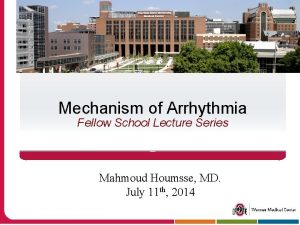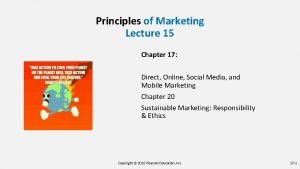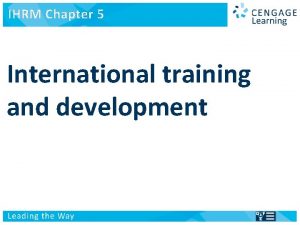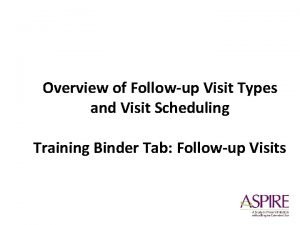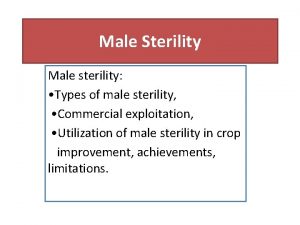Engaging Dads in Home Visits Neil Tift Male


























- Slides: 26

Engaging Dads in Home Visits Neil Tift Male Involvement Coordinator Family Resource Center

Fathers are often more reluctant than mothers to fully participate in home visits. This tends to be true across cultures, income levels, educational backgrounds and neighborhoods. In order to engage fathers and men in families more fully, it is important to address some common barriers or misconceptions that typically limit father involvement.

When scheduling your home visit, ask if there are times that both parents are available to meet with you. Try to schedule the visit to accommodate both. When you arrive, mention that you have information about resources specifically of interest to fathers and men.

When meeting the father for the first time, look at him and shake his hand. Tell him that you are glad he is able to be part of the home visit and that you would like to speak to both of the parents during the visit. Be certain to bring select materials that are specifically targeted for fathers and men: brochures, flyers, schedules, articles and other material that are clearly of interest to dads and men.

Ask them if they would each like to have a few minutes of one-to-one time with you to talk about specific parenting issues, if this option is culturally acceptable. Often a father may open up if he feels that he can trust you to listen to him non-judgmentally and seek your perspective on his parenting concerns and questions.

Be aware that men’s learning styles and parenting approaches tend to be action-oriented. Fathers tend to use their bodies more, so if you are going to discuss specific skills, consider demonstrating them and then letting the fathers demonstrate them as well. Touching, holding, moving through space, walking, mixing, arranging, wiping, dressing, rocking and other active methods are more likely to be effective and to be retained by the men with whom you visit.

During your conversations with them, try to look at him and to engage him as often as it seems appropriate. You don’t have to focus on 50/50, but try NOT to speak mostly to the mom. If he feels slighted or marginalized, he probably won’t prioritize your next home visit.

• Ask him open ended questions about his child rearing activities around the home. • How is he involved in the baby’s/child’s daily routine? • What skills does he feel confident about? What are his strengths as a dad?

Getting Involved Formula Prep Holding the baby Getting up in the night to bring baby in to be fed Feeding the child Playing with the baby Bathing the baby Changing diapers or wet clothing

Getting Involved Rocking baby to sleep Calming the child Reading or singing to the baby Dressing the child Putting the baby down for a nap Strapping the child into the car seat Packing the diaper bag Taking the child on errands

Suggested Questions • How does he feel when he is alone with the baby? • Are there significant differences between how he parents their baby and the mother parents their baby? • How does he handle stressful times with the child? Crying, colic, running around, saying “no”, arguing, temper tantrums, making messes, etc. ?

• How do they, as a couple, handle stressful times? • What resources does he have to provide back up when he feels stressed? • What resources do they have to provide back up when they feel stressed?

• What skills would he like to improve or get some help with? • What skills would he like both of them to improve or get some help with? • What tasks is he comfortable sharing with the baby’s mother?

• What tasks does mom feel uncomfortable with him performing? • What tasks does he wish the mother let him perform more? • What future does he see for his baby/child? • What resources would he like to see available for him to be the best dad that he can be? That they can be?

Make your own observations about each of the items listed above. See for yourself his personal comfort level and his skill level in his interactions with the baby/children. But remember, Dads do not “mother” their children. They “father” their children.

Ask him if he was able to be present at his baby’s birth. This is often a very transforming moment for most fathers. • What was that experience like? • How has this changed him?

You might ask him what his relationship was like with his father. (But maybe not) Are there similarities between his parenting and that of his father? Fathers often see one of their primary roles as the provider. If he is unemployed or under employed, that could be a sensitive issue. Fathers truly see one of their primary roles as that of protector of the family. So talk about how he might offer a sense of safety or security for the children in the home. This often gives them a sense of purpose in their interactions with the child.

Safety Suggestions • Is their household safe for their toddler or a child who is starting to crawl? • Do the electric outlets close to the floor have cover plates? • Are the slats in the baby crib no wider than 4 inches apart? • Are nuks and pacifiers free of long cords that could strangle a child?

• Are the bottles, cans and other containers under the kitchen sink free of dangerous or toxic ingredients? • Are low level furniture items (coffee tables, end tables) free of sharp or pointed edges that could hurt a falling or teething toddler? • Are book cases and entertainment centers secured to the walls so that climbing child cannot tip them over?

As their children grow older, fathers see their protector role change to reflect that. A third primary role that many fathers assume is that of the disciplinarian. What is his style and preference in setting limits with his child? How will he help his child learn right from wrong, good from bad?

Attitude & Response What is his attitude and response when a child is disruptive during the home visit? Does he work with the mother? Does he let her handle the situation or does he handle it? How are healthy limits set?

Language and attitude is important in establishing rapport with parents. Fathers may respond differently than mothers do to certain words, phrases or messages. • “To mother” and “to father” a child has opposite connotations. • Sports and cars are often stereotypes of what men are comfortable with in beginning conversations with strangers or those in authority. If you are comfortable in using sports analogies applied to parenting, go for it. But if not, avoid going there.

• Some fathers may be reluctant to see themselves as a teacher to his child, especially for low-income men who did not finish school, due to bad experiences. They might associate this with failure, drop-out, conflicts, etc. • Fathers might see themselves more as a coach, and all that image entails: goal setting, being persistent, team work, trying again, sharing responsibilities, self -improvement, personal accountability, dealing with conflict and criticism, motivation, communication, mentoring, focusing, improving personal performance, developing leadership skills and learning to lose gracefully.

• Another core element of sports is the win/lose approach that it typically perpetuates. There is a time for that win/lose approach, but in parent-child and parent-t 0 -parent relationships, the win/win approach is preferred.

Don’t let paperwork get in your way. While this is important for eligibility and documentation purposes, try to spread it over time to allow more interesting and stimulating interactions with your families. Be aware of personal messages that you carry about fathers and men.

Presented by: Neil Tift Male Involvement Coordinator Child Crisis Center 817 North Country Club Drive Mesa Arizona 85201 480. 834. 9424, Extension 424 neil. tift@childcrisis. org
 Neil tift
Neil tift Pastoral home visits
Pastoral home visits Joseph jackson lister
Joseph jackson lister Carmel dads club
Carmel dads club Safest antiarrhythmic drug
Safest antiarrhythmic drug Dads
Dads The taming of the shrew and 10 things
The taming of the shrew and 10 things Dads
Dads Fundal level
Fundal level Dynamisch verbinden
Dynamisch verbinden Marketing involve engaging directly with carefully targeted
Marketing involve engaging directly with carefully targeted Marketing involve engaging directly with carefully targeted
Marketing involve engaging directly with carefully targeted Reddit
Reddit Benefits of site visits
Benefits of site visits Mary visits elizabeth
Mary visits elizabeth Preliminary visits for expatriates
Preliminary visits for expatriates Put each verb in brackets into the correct tense
Put each verb in brackets into the correct tense Margo and her parents (visit-visits) each other often
Margo and her parents (visit-visits) each other often In on at practice
In on at practice Antenatal visits
Antenatal visits Banc plus checklist
Banc plus checklist Nicodemus visits jesus
Nicodemus visits jesus Follow up visit
Follow up visit Why does the apothecary agree to sell romeo poison
Why does the apothecary agree to sell romeo poison Plural of flower
Plural of flower Let's go to my house
Let's go to my house Perbedaan home care dan home service
Perbedaan home care dan home service







